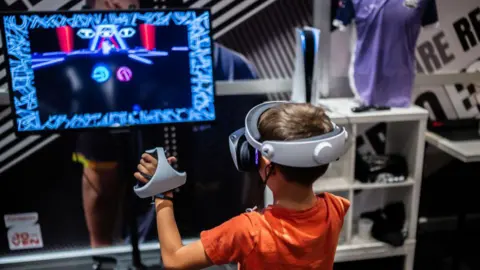Will VR and movement finally dominate gaming?
 Getty Images
Getty ImagesVideo games bought for Christmas can lead to too much screen time in the new year.
But if video gaming could be combined with a workout, would that ease some worries over how much time we spend on screen?
That should be where virtual reality (VR) comes into its own, but it has not yet dominated gaming in the way once thought.
Despite all the advances in technology, many of us still play games like we did a decade ago - on a screen with a hand-held controller.

According to Prof Cathy Craig, that is set to change.
Getting us moving while playing could be key.
Prof Craig's academic career at Ulster University focuses on perception and the study of movement, and she is a former rugby player herself.
She is now the chief executive of Incisiv, a Belfast-based technology company which develops virtual reality games and training aids.
"We're very much interested in how we can use the power of gameplay to really get people moving, to really improve their performance as well," she told BBC News NI.
"So whether you're a Sunday afternoon athlete or somebody who really wants to hit that top level we're about trying to improve those general motor skills that you have and that are fundamental to any sports you play.
"We had a flavour of it when we had the Nintendo Wii back in the late 2000s."
First released in 2006, the Wii console had a remote controller which allowed users to play games through simple physical movements.
It meant that to play tennis on screen, for example, users had to move their arms and bodies as if swinging a tennis racket to hit a ball.
Wii was popular, with more than 100 million sales, but it was of its time.
More recently Sony released the PlayStation VR2 for virtual reality gaming.
But some organisations have abandoned VR projects, raising questions over the long-term future of the technology.
Incisiv has just released Dodgecraft, which replicates some of the moves and reflexes needed by rugby, football and dodgeball players.
Whether dodging asteroids or tackling sprinting robots, the player has to duck, sidestep, weave and move.
After five minutes playing through a VR headset I was puffing a bit.
Sports games are "the most obvious ones" to utilise the power of virtual reality, according to Prof Craig.
"You use movement as the game controller and not a joystick or buttons, " she said.
The idea for Dodgecraft came from work she did with Ulster Rugby a decade ago, using virtual reality to help players with their tackling technique.
"The question really was 'what makes a good sidestep?' she said.
"How could somebody beat you when you're the last defender? How could they fool you into thinking they're going one way when they actually step and go the other way?
"That evasion skill is very, very important but it's very hard to train unless you've somebody running at you."
Incisiv's previous game and training aid - called Clean Sheet - used the same principle, allowing players a goalkeeper's perspective as an opposing soccer team created moves and took shots at them.
"It's like a play simulator that allows you to train those important sporting skills," Cathy Craig said.
The cost behind VR
Cost, though, had been one of the things holding virtual reality back.
While some virtual reality headsets still cost thousands of pounds, some of the most popular ones cost less than £500.
That means that many headsets have come down in price, and cost almost the same as a games console.
And, according to Prof Craig, the technology is also getting better.
"The sensors are getting better, that ability to map movement into gameplay has got so much better as well." she said.
And there will be more developments to come.
"We're looking forward to having feet controllers as well, because if you think about it that'll open up a lot more possibilities in terms of what you can and can't do," Prof Craig said.

There have already been virtual martial arts tournaments as part of preparations for the first Esports Olympics in 2025.
And according to James Stafford of Incisiv, virtual reality is ideal for the "blend between gaming and fitness and training."
"We like to build applications that people enjoy to play, but also having that hidden agenda behind them of making you sharper, higher agility and getting fitter at the same time," he said.
"Dodgecraft is more akin to things like rugby, where you're tackling and evading opponents."
The target market, according to James Stafford, are people who "love sport and love gaming."
He also said it could ease concerns many parents had that their children were getting too much screen time and too little physical activity.
"How much screen time do we want our kids realistically doing?" he said.
"Let's say you only have two hours of screen time during the day, what do you want to spend that two hours doing?"
"Do you want two hours on a couch watching TV or playing a games console, or do you want to be doing physical activity in that screen time?"
"So it's actually a way of maximising the benefit you can get from that screen time."
Incisiv is just one of about 40 video games companies in Northern Ireland.
Overall, the UK's video games industry employs about 76,000 people and is estimated to bring £6bn a year to the UK economy.
